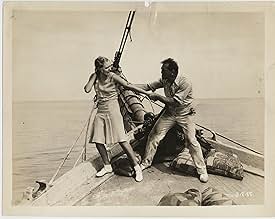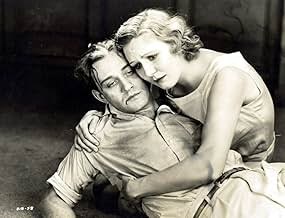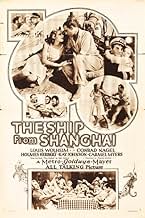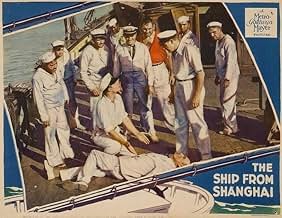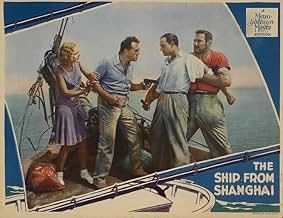Ajouter une intrigue dans votre langueOn a yacht sailing from Shanghai to the United States, the sailors, led by the megalomaniac steward, revolt and take control.On a yacht sailing from Shanghai to the United States, the sailors, led by the megalomaniac steward, revolt and take control.On a yacht sailing from Shanghai to the United States, the sailors, led by the megalomaniac steward, revolt and take control.
- Réalisation
- Scénario
- Casting principal
Henry Armetta
- Sailor
- (non crédité)
Willie Fung
- Shanghai Nightclub Patron
- (non crédité)
Pietro Gentile
- Minor Role
- (non crédité)
Pat Harmon
- Sailor
- (non crédité)
Albert MacQuarrie
- Sailor
- (non crédité)
Pat Moriarity
- Sailor
- (non crédité)
Kane Richmond
- Shanghai Nightclub Patron
- (non crédité)
Floyd Shackelford
- Sailor
- (non crédité)
Otto Yamaoka
- Shanghai Nightclub Patron
- (non crédité)
Avis à la une
1930 was the year that MGM went to all-talkie production and this movie demonstrates their lack of ease with the new medium. In addition they saddled themselves with a lot of sequences shot on the water, always a risky proposition -- although the ship was likely at the docks.
Meanwhile this production is afflicted with all the stereotypical problems of early sound productions: a static camera, unnatural-sounding sound with a lot of hiss and badly directed dialogue. Even if you discount these problems, this story of how brutish purser Louis Wollheim seizes control of a yacht after it is wrecked in the storm lacks interesting characters. Each character can be defined in a sentence. The interesting parts of the movie are the sailors trying to deal with the storm as it swamps the yacht; and Kay Johnson checking on the badly injured Conrad Nagel. Those, however, are clearly shot MOS. The rest of the movie makes use of cuts where a moving camera would have been better.
MGM clearly figured this movie to be a greater success than it turned out and its failure pretty much ended the career of Kay Johnson and knocked Conrad Nagel out of the leading man category. Louis Wollheim survived and prospered off his next movie, the great ALL QUIET ON THE WESTERN FRONT. If the MGM brass thought this movie would propel them firmly into the sound era, they were sadly mistaken.
Meanwhile this production is afflicted with all the stereotypical problems of early sound productions: a static camera, unnatural-sounding sound with a lot of hiss and badly directed dialogue. Even if you discount these problems, this story of how brutish purser Louis Wollheim seizes control of a yacht after it is wrecked in the storm lacks interesting characters. Each character can be defined in a sentence. The interesting parts of the movie are the sailors trying to deal with the storm as it swamps the yacht; and Kay Johnson checking on the badly injured Conrad Nagel. Those, however, are clearly shot MOS. The rest of the movie makes use of cuts where a moving camera would have been better.
MGM clearly figured this movie to be a greater success than it turned out and its failure pretty much ended the career of Kay Johnson and knocked Conrad Nagel out of the leading man category. Louis Wollheim survived and prospered off his next movie, the great ALL QUIET ON THE WESTERN FRONT. If the MGM brass thought this movie would propel them firmly into the sound era, they were sadly mistaken.
A group of wealthy socialites take a cruise on their yacht but a storm cripples the ship, making it possible for the disgruntled crew to mutiny.
Flat-nosed Louis Wolheim does his best in the role of an insane crewman with dreams of power but his exaggerated performance makes this dull film laughable and only mildly entertaining. The acting is stagy, the story melodramatic, and the early sound technology makes for long stretches of awkward silence. Unless you're interested in someone from the cast, or want to see how bad some early talkies could be, skip this one.
Flat-nosed Louis Wolheim does his best in the role of an insane crewman with dreams of power but his exaggerated performance makes this dull film laughable and only mildly entertaining. The acting is stagy, the story melodramatic, and the early sound technology makes for long stretches of awkward silence. Unless you're interested in someone from the cast, or want to see how bad some early talkies could be, skip this one.
That's the sound that this ancient maritime drama makes as it meanders through it's less than exciting hour long running time. Set on a transoceanic trip from Shanghai to San Francisco, the film stars Kay Johnson, Conrad Nagel, and Zeffie Tilbury as a group of incredibly annoying passengers who end up under the thumb of evil steward Louis Wolheim, who seems to be channeling the spirit of a very dumb and quite drunk Wallace Beery. There's some scratchy stock footage of Chinese villagers to help set the scene and a bizarre (and pointless) rendition of Singin' In the Rain performed by a band of Asian men in coolie hats. This badly recorded, crude early talkie will put most viewers to sleep.
Yes, this early talkie is not the smoothest production to watch. And some of the acting could have been more subtle. But I found it interesting to watch--mostly because it represents an historic era in filmmaking.
The story is about a small group of idle rich who decide to sail a yacht across the Pacific. During the trip, they are ignorant of the crew's dissatisfaction with the way they are treated. The steward, Ted, especially is resentful of his lot in life. He privately vents his anger over having to wait hand and foot for people who, he feels, are no better than he.
Due to uncontrollable circumstances, the situation changes. Class distinctions break down and Ted makes a power play, motivated by revenge and his perception of "justice".
Variations of this story have been filmed numerous times since, which makes me wonder if some of them originated from this film. There are definite similarities between this film and "Swept Away", which I heartily recommend--the original directed by Lina Wertmuller.
The story is about a small group of idle rich who decide to sail a yacht across the Pacific. During the trip, they are ignorant of the crew's dissatisfaction with the way they are treated. The steward, Ted, especially is resentful of his lot in life. He privately vents his anger over having to wait hand and foot for people who, he feels, are no better than he.
Due to uncontrollable circumstances, the situation changes. Class distinctions break down and Ted makes a power play, motivated by revenge and his perception of "justice".
Variations of this story have been filmed numerous times since, which makes me wonder if some of them originated from this film. There are definite similarities between this film and "Swept Away", which I heartily recommend--the original directed by Lina Wertmuller.
In far eastern Shanghai, wealthy westerners enjoy singing and dancing to the hit song "Singin' in the Rain" (a contemporary hit then, memorably revived for MGM's 1952 musical). Among the party-goers, American playboy Conrad Nagel (as Howard Vazey) romances British socialite Kay Johnson (as Dorothy Daley). With three other upper-class passengers, they get on board a yacht bound for San Francisco. Brutish and angry steward Louis Wolheim (as Ted) is on "The Ship from Shanghai" and, as you quickly know, he hates snooty rich people – with a passion. "Willowy English girls, fair and pink" arouse Mr. Wolheim, who plans to take over the ship and abduct Ms. Johnson...
Making his "all-talking" feature debut, director Charles Brabin is clearly getting his feet wet under the new microphones. He is unable to lead an interesting cast to good, consistent performances. New to motion pictures, Johnson comes across best; she had just co-starred with Mr. Nagel in Cecil B. DeMille's "Dynamite" (1929). Watching Nagel's career falter is sad; he was an engaging and popular actor. "Silent" film stars Carmel Myers and Holmes Herbert (as Viola and Paul Thorpe) attend to the secondary roles, with veteran stage actress Zeffie Tilbury on board as an old society lady. Some of the acting works better with the sound turned down, but some is just overwrought, period.
**** The Ship from Shanghai (1/31/30) Charles Brabin ~ Louis Wolheim, Kay Johnson, Conrad Nagel, Carmel Myers
Making his "all-talking" feature debut, director Charles Brabin is clearly getting his feet wet under the new microphones. He is unable to lead an interesting cast to good, consistent performances. New to motion pictures, Johnson comes across best; she had just co-starred with Mr. Nagel in Cecil B. DeMille's "Dynamite" (1929). Watching Nagel's career falter is sad; he was an engaging and popular actor. "Silent" film stars Carmel Myers and Holmes Herbert (as Viola and Paul Thorpe) attend to the secondary roles, with veteran stage actress Zeffie Tilbury on board as an old society lady. Some of the acting works better with the sound turned down, but some is just overwrought, period.
**** The Ship from Shanghai (1/31/30) Charles Brabin ~ Louis Wolheim, Kay Johnson, Conrad Nagel, Carmel Myers
Le saviez-vous
- Citations
Howard Vazey: It isn't a jazz band; its a band of angels.
- Versions alternativesMGM also released this picture as a silent film, but no details are known.
- Bandes originalesSingin in the Rain
(1929) (uncredited)
Music by Nacio Herb Brown
Lyrics by Arthur Freed
Played by a band in a Shanghai nightclub as dance music and sung in a Chinese dialect by the band members
Sung also by Conrad Nagel in English as he danced with Kay Johnson
Reprised a cappella by Conrad Nagel aboard the yacht
Meilleurs choix
Connectez-vous pour évaluer et suivre la liste de favoris afin de recevoir des recommandations personnalisées
Détails
- Durée1 heure 7 minutes
- Couleur
- Rapport de forme
- 1.20 : 1
Contribuer à cette page
Suggérer une modification ou ajouter du contenu manquant


